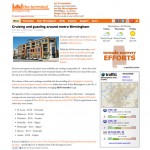Question:
How are other community news startups, like The Terminal, who have been in business for a few years, building and sustaining their business online?
For businesses of all stripes, staying relevant and serving content that is meaningful to your communities or customers is a daily commitment. What techniques, tactics or tools have you found keep things fresh and have deepened your business staying power?
Who wants to know?
André Natta is a freelance writer and urbanist from The Bronx living in Birmingham, AL. He started and maintains The Terminal, an online community hub, writes a monthly column on technology and how it’s affecting the future of Birmingham, served as a founding organizer of WordCamp Birmingham and serves on several boards in his community.













Answers: Remember to refresh often to see latest comments!
27 answers so far.
-
 André Natta says:
André Natta says:
November 16, 2011 at 9:06 am
-
 Denise Cheng says:
Denise Cheng says:
September 26, 2011 at 1:49 am
-
 André Natta says:
André Natta says:
October 20, 2011 at 8:59 am
-
 Christopher Wink says:
Christopher Wink says:
September 13, 2011 at 8:07 am
-
 Lisa Skube says:
Lisa Skube says:
September 28, 2011 at 10:54 pm
-
 Christopher Wink says:
Christopher Wink says:
September 29, 2011 at 9:59 am
-
 André Natta says:
André Natta says:
October 20, 2011 at 9:03 am
-
 Emily Harris says:
Emily Harris says:
October 20, 2011 at 12:21 pm
-
 Citizen Media Law says:
Citizen Media Law says:
September 13, 2011 at 6:51 am
-
 André Natta says:
André Natta says:
September 13, 2011 at 8:03 am
-
 Richard C. Hsu says:
Richard C. Hsu says:
September 12, 2011 at 2:39 pm
-
 André Natta says:
André Natta says:
September 13, 2011 at 8:06 am
-
 Mike Fancher says:
Mike Fancher says:
September 12, 2011 at 12:15 pm
-
 André Natta says:
André Natta says:
September 13, 2011 at 7:57 am
-
 Peter Kleid says:
Peter Kleid says:
September 10, 2011 at 12:09 pm
-
 Karl Pearson-Cater says:
Karl Pearson-Cater says:
September 6, 2011 at 2:29 pm
-
 Andre Natta says:
Andre Natta says:
September 7, 2011 at 6:58 am
-
 Karl Pearson-Cater says:
Karl Pearson-Cater says:
September 8, 2011 at 1:21 pm
-
 jessica durkin (@jessdrkn) says:
jessica durkin (@jessdrkn) says:
September 6, 2011 at 11:01 am
-
 Winning Mark says:
Winning Mark says:
September 6, 2011 at 9:54 am
-
 Andre Natta says:
Andre Natta says:
September 7, 2011 at 6:36 am
-
 Sarah Fidelibus (@verbalcupcake) says:
Sarah Fidelibus (@verbalcupcake) says:
September 6, 2011 at 6:53 am
-
 Derek Neighbors says:
Derek Neighbors says:
September 5, 2011 at 5:38 pm
-
 @acnatta says:
@acnatta says:
September 5, 2011 at 9:56 am
-
 M. A. Iverson (@miverson) says:
M. A. Iverson (@miverson) says:
September 3, 2011 at 7:47 pm
-
 @griner says:
@griner says:
September 3, 2011 at 9:06 am
-
 @bhamterminal says:
@bhamterminal says:
September 3, 2011 at 5:57 am
| ParticipantsHey Emily! This is an extremely belated response to your question, but here it goes.
I think that events give us the opportunity to see a story shift before our eyes, sometimes getting us to look at a different angle. Getting people that won’t necessarily participate in the online discussion in a room with others should help contributors get a better sense of what needs to be covered and what needs to be focused on. It may also give us the chance to take a deeper look at one part of an issue while generating additional online content (audio clips, video, etc.).
It seems like folks treat online and offline as two separate beasts; sometimes it’d be nice to see them as complementary. A comment on a post may lead to an event while an event’s success may lead to a deeper investigation of issues on the site.
I was just at USC for the Knight Community Info Challenge boot camp, and one of the points that the circuit riders emphasized was as you become viable, 80% of your funding should not come from 20% of your sources OR if you lose any one funding stream, it shouldn’t cripple your operations. (http://www.knightdigitalmediacenter.org/seminars/archives/knight_community_information_challenge_bootcamp_2011/)
Over at The Rapidian, we just celebrated year two, and we’ve launched an advertising platform while also getting underwriting for special projects. We’re looking into underwriting for particular beats as well as opportunities for grant funding and (finally!) asking for direct contributions. So nothing new here, but diversifying funding streams commensurate with the time you can spend cultivating and maintaining them.
Hey Denise! It was good to get a chance to catch up in Boston and Chicago recently. As I’m finally getting settled back in here I believe more than ever that startups need to diversify how they are funded. It also helps demonstrate a level of stability that advertisers and supporters of the site will appreciate and respect.
I’m wondering what other ways we can diversify funding and if we sometimes think too small in terms of what’s possible?
Two colleagues and I launched technology news site Technically Philly in early 2009 (we launched its parent company Technically Media later on) without outside investment, and now all three of us are full-time employees.
While advertising brings in some revenue, we’ve focused on three income streams: (1) events and sponsorships (2) foundation-funded projects and (3) content-driven consulting.
Hey Christopher, during the “Business of Journalism” #wjchat you hosted, you said ”@wjchat Across the three of us @technicallym 30 percent reporter, 40 percent business, 20 percent web dev, 10 percent design #wjchat.”
Do you think this division of labor was unique to the market you and your partners focused on or that there are general lessons to be drawn for new media publishers in broad strokes? Is focusing on the business piece of the pie the most important from the start or did your business model develop and shift % over time?
Our business model certainly developed, though our original business plan was a helpful blueprint. That said, I think there are lessons to be had from our division of labor across niches and verticals. I’d expect there to be similar numbers elsewhere, though I’ll say looking back, I think was speaking pretty generally about the web dev and design parts. Everything else is secondary to reporting and business, which includes admin, outreach and event planning.
A lot of folks don’t seem to want to do event planning themselves, though I’ve found it to be a great way to do outreach and build stronger relationships with the community we serve. It’s a main reason we’re able to think about pivoting how we approach things from the news side; they’re willing to wait for us to produce the best product possible.
Would you say that the site does a good job of facilitating connections within the community?
Hi Andre – I’m curious what you mean about “pivoting how you approach things from the news side” as you’re event planning. Can you tell me a story? 🙂
Also, how about sharing ideas for innovative events? Here’s one to start – Barry Johnson at Oregon Arts Watch (www.orartswatch.org) brought in an audience to watch three different directors work two actors through the same scene. The directors couldn’t see the others work – so the audience got a real peek into their brains. Barry writes it up here: http://www.orartswatch.org/first-person-account-behind-the-curtain-gets-busy/ – saying he “wildly underestimated how engaging the whole thing would be.”
Full disclosure, I didn’t see the event but it sounded so neat I hope they do it again next year! I’d love to hear about other types of events people have put on that might have legs to replicate in other communities.
Although it might be obvious, an important factor in the continuing viability of a digital media venture is selection of the proper corporate form. For example, community news startups might consider using the “cooperative corporation” form, which is recognized in many states and is designed to allow active community participation in a business venture while preventing domination of the venture’s agenda by a small group of stakeholders. There are also tax benefits for distribution of excess profits to members of the cooperative, and depending on where you are incorporated, a cooperative corporation might also be able to be operated as a for-profit business.
Of course, other corporate forms will be suited to other kinds of ventures. LLCs are often favored for their flexibility and minimal state reporting requirements, but can be more complex to set up. 501(c)(3) non-profits allow you to receive deductible donations, but there are limitations on political and advertising activity.
Thanks for making me aware of the cooperative corporation option; I’ll have to see if it’s possible here in Alabama. I’d looked into L3C as an option at one point but it’s not possible here – yet.
One of the issues here is how many non-profits already operate in Alabama in general and Birmingham specifically. Most of my professional life before The Terminal was spent in the non-profit world and its just as difficult of a long-term process as for-profit, especially as several organizations are battling for the same small piles of money. Am I being too sensitive about the issue or not sensitive enough?
(1) pick topics which are not so time sensitive or dependent. I know everyone wants to blog about the latest news but I try to choose topics which will be good at least a couple years from now.
(2) get a plugin which automatically rotates all the posts frequently. If you follow #1 then everytime someone hits your website, it will look new.
Good tips! The site’s actually been dormant in part because I was focusing on what to do next instead of just doing the work. We used to post between 5-8 times a day. That slowed down as the number of people contributing dwindled. I’m hoping that folks will start to see new content on a daily basis again in the very near future.
Unfortunately, there is no simple answer to this question, but some websites and individuals are watching the action as closely as possible. In addition to the Journalism Accelerator, I recommend tracking J-Lab.org, where Jan Schaffer and her crew are on top of the latest developments.
Michele McLellan at the Knight Digital Media Center is also a great source. Watch for reports from her Block By Block Summit 2011 later this month.
I think the fact that there’s not one solution but that we can all learn from what others have tried speaks to the diversity of the communities that we represent (and to why so few networks appear to be successful).
I’m hoping folks feel they can share some ideas in this thread so that some of that influencing can happen. I think it’s particularly important since we still need to get more online publishers who aren’t going to those types of events engaged somehow in this process so they know they aren’t alone.
I’m looking forward to attending this year’s Block by Block Community News Summit (after serving on a panel at last year’s gathering).
At zoomvillage.com (a platform for creating local online newspapers), we approach sustainability in terms of minimizing the resources needed to create and manage the newspaper. By providing a self-service process for advertisers — which lets them create, submit and pay for ads on their own — we’ve reduced the need for a dedicated sales staff. We also give editors a very easy way to layout their newspaper, and if they prefer to leave layout to us, our service can do it automatically. The point is to free up as much of the staff’s time as possible to do the most important job for any newspaper: researching, writing and editing high quality stories.
When I was working at MinnPost, I felt the only way to find a sustainable business model for a News publication was to find a revenue stream that had nothing to do with News. Like Classifieds did for newspapers.
If you believe that theory, then Paywalls are not it. Instead, work toward something that fits your resources and talent to discover the revenue stream.
At MinnPost, we created an advertising tool called RealTimeAds.com — we used it to sell ads on MinnPost.com, of course, but the idea was to create an easy to use advertising platform that other publications could either purchase a license or pay through a revenue share. It hasn’t worked out like that, mostly due to resources, but you get the idea. It could have been a revenue source unrelated to News.
Maybe you have someone on staff who organizes events really well. Attach your brand to the events, create buzz, and sell sponsorships. Again, running events are not connected to News coverage, but could be a new $$ stream.
Thanks for commenting Karl:
Non-news related streams are definitely something I’ve looked at (particularly looking to what sites like MinnPost were doing as inspiration). One idea is to take advantage of my background in urban revitalization (& the backgrounds of the new contributors) to determine events to create – potentially tying it to what we cover. There are several groups making concerted efforts to point out issues while not necessarily presenting viable solutions. I’ve been scared to look at doing solutions because of how some have made it sound like it’s not really doing journalism. I’m starting not to listen to them though 🙂
I agree on the paywall comment which is why I’ve tried the voluntary donation (though not nearly as aggressively as I should). I’ve also been mildly successful with t-shirts based on an old Birmingham city slogan. Maybe partnering with existing efforts by offering to provide organizational support is another way to go; any thoughts on that?
Good ideas, Andre. Check out Minnpost’s annual MinnRoast event — it gets bigger and better every year. And you should check out what the Texas Tribune is doing with events. Editor Evan Smith has fantastic moderator skills. They’ve hired vidoegraphers to capture events and turn some clips into news items (like you were suggesting.)
Another “kindof” unrelated revenue stream to news is donations. I’m a believer that news websites should go the non-profit route and solicit donations from it’s members. That’s a better option to a “paywall” — allow your super fans and advocates to help support your news coverage.
I should also mention that finding these non-news sources of revenue should work along side traffic-building, online banner ad sales, email newsletter sponsorships, and other advertising efforts! My only suggestion is that those initiatives *alone* will not create a sustainable business model for news sites.
RT @SaveTheNews: How are community news startups building and sustaining their business online? http://t.co/61eNrQJ via @journaccel cc @mybxb
We have stepped up blogging and tweeting as a way to communicate with our customers and potential customers, and this is definitely unusual in our particular space. Not unheard of, but still unusual. We have a number of team members on Twitter, tweeting as @winning_mark using tools like Co-Tweet and Tweetdeck. Blogging we do as a team as well, with the goal of introducing and connecting various team members with customers/potential customers and the broader community through their blog posts. Team members blog about their individual projects and areas of interest and expertise.
BTW Andre – love the title urbanist but curious how you would describe that.
Hey Mark (& team):
I’ve noticed while it wasn’t nearly as extensive as what I and others in the area attempted during and after the tornadoes here in April, retweeting pertinent information as Tropical Storm Lee passed through the area was seen as helpful by many members of our online community. It’s still serving as a primary source of information for approximately 10% of the metro area. It’s not something that can be easily measured but is extremely intangible. The importance is to make sure folks know you’re listening.
I’d describe an urbanist as someone who studies cities – how they work, why they don’t work sometimes, and the social issues related to why they work. I tried to do a better job of explaining it here though – http://bit.ly/f0Nm3z
Help the awesome @acnatta answer his Q: How are community news startups building, sustaining business online? http://t.co/2VcLCJ3 #wjchat
@tdhurst @markng @longcreative do you have thoughts on news startups? Give your opinion.. http://t.co/G2p0Q65 #journalismaccelerator
Hey #mybxb! I’d love to get your input on this question I’ve posed on @journaccel RE: building sustainability – http://t.co/vvRYAf1
RT @acnatta: How are hyperlocal startups like @bhamterminal building & sustaining their business? Come share @journaccel: http://t.co/vvRYAf1 #wjchat
RT @acnatta: How are hyperlocal startups like @bhamterminal building & sustaining their business? Come share @journaccel: http://t.co/vvRYAf1 #wjchat
RT @acnatta: How are hyperlocal startups like @bhamterminal building & sustaining their business? Come share @journaccel: http://t.co/vvRYAf1 #wjchat